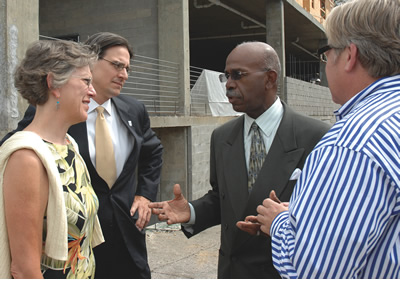Opening Doors for Low- and Moderate-Income Communities
Community Development
Promoting community and economic development in low- and moderate-income (LMI) areas, as well as promoting fair and equal access to credit for LMI families, is the mission of the Federal Reserve's Community Development offices.

Bringing people together to help underserved communities.
The Federal Reserve Bank of St. Louis' Community Development staff provides financial institutions, nonprofit organizations and others with information on the Community Reinvestment Act (CRA), on community and economic development, on household balance sheets and on issues related to credit access. The staff also facilitates partnerships between lenders and their communities in the Eighth District to advance issues pertaining to community development finance, neighborhood stabilization and household financial stability.
In its outreach efforts, the staff provides information about the availability of public and private community development resources; it also promotes an understanding of the rights and responsibilities of individuals, communities and institutions regarding federal laws on such topics as community reinvestment and mortgage disclosure. The key law is the CRA, passed by Congress in 1977. The law requires federal financial regulatory agencies, such as the Fed, to encourage regulated financial institutions to help meet the credit needs of their local communities, including LMI neighborhoods. In 1981, each of the 12 Federal Reserve banks established a Community Development office to fulfill that mandate.
From its headquarters in St. Louis and branch offices in Little Rock, Ark., Louisville, Ky., and Memphis, Tenn., the Eighth District Community Development department publishes research, analysis and other information in various publications, including: Bridges, the Community Development Outlook Survey, the Housing Market Conditions Report, News from the Center for Household Financial Stability, In the Balance and periodic research reports.
Bridges is a quarterly review of community and economic development issues, projects and regulatory changes. The publication is aimed at practitioners from community-based organizations, financial institutions' CRA officers, academics and government officials.
The annual Community Development Outlook Survey monitors the economic factors affecting LMI people and communities in the Eighth District.
The Housing Market Conditions Report is a quarterly overview of housing market conditions in the U.S. as a whole as well as in each of the seven states and the four major metropolitan areas of the Eighth District.
News from the Center for Household Financial Stability is a periodic newsletter noting key research, publications and events at the center. The center was established in 2013 within the St. Louis Fed's Community Development department. The center focuses on the household balance sheets of struggling American families. (See the essay "Center for Household Financial Stability.")
In the Balance consists of research briefs related to new perspectives on timely household balance-sheet issues.
The staff convenes those working in the field of community development at several in-person events each year. One of the highlights is the Exploring Innovation program, which uses events and webinars to raise awareness of innovations in the field and to search for new ways to improve life in LMI areas.
Leaders from organizations throughout the District serve on the Bank's Community Development Advisory Council. The executives are experts in community and economic development and represent nonprofit organizations, financial institutions, universities, governments and foundations. The council was created to keep the St. Louis Fed's president and Community Development staff informed about community development issues and to suggest ways the Bank might support local development efforts.


